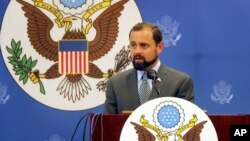The U.S. government has begun putting sanctions on Burundian officials who are involved in stoking the ongoing political and security crisis in that country that has forced over 200,000 refugees to flee.
Washington imposed sanctions Monday on four Burundian officials. They include Security Minister Alain Guillaume Bunyoni; deputy director of the national police, Godefroid Bizimana; former defense minister Cyrille Ndayirukiye and former intelligence chief Godefroid Niyombare.
Thomas Perriello, the U.S. Special Envoy for the Great Lakes Region of Africa, says it is critical for both the government in Bujumbura and the opposition to engage in political dialogue to restore peace to the Central African nation.
"The clear message here is those who take a path of violence and repression will face serious consequences," he said. "We will continue to look at efforts to expand the sanctions list as needed based on the actions of those in the government and in the opposition."
International intervention
Opposition and civil society groups have called for an international intervention to help end the escalating violence in Burundi.
They have also expressed concern that the recent decision of the government to forcefully disarm civilians who own or possess "illegal" weapons could worsen the crisis and plunge the country into chaos and possible civil war.
But the administration in Bujumbura has dismissed their call as without merit. Officials insist Burundi is not on fire, as is being peddled around by the opposition and civil society groups.
Supporters of the government also say they are opposed to foreign intervention. They said the U.S. sanctions are unlikely to help ease tension or resolve the challenges the country is facing. They also said the sanctions are a form of intervention, adding that Burundians should be allowed to resolve their own problems.
'Path of progress'
But Perriello said, "We are trying to offer the government our best advice, and we believe getting to the peace talks to get Burundi back on the path of progress and democracy is the right path. And that trying to escalate tactics of repression and violence are only going to create more pain for the people of Burundi."
Perriello says the administration continues to maintain that it is in control of the situation in the country, despite escalating violence. He adds that the withdrawal of international organizations from the country – including the International Conference on the Great Lakes Region, a regional block – is an indication that the security situation is not improving.
"We think it's important for the path forward the path forward to be based on reality and not on rhetoric,” he said. “The reality is that we have a deeply divided country, and one that is not entirely stable, where the political space has been closed. We need step by step to be reopening that political space and opening that dialogue for the interest of all the people of Burundi.”












